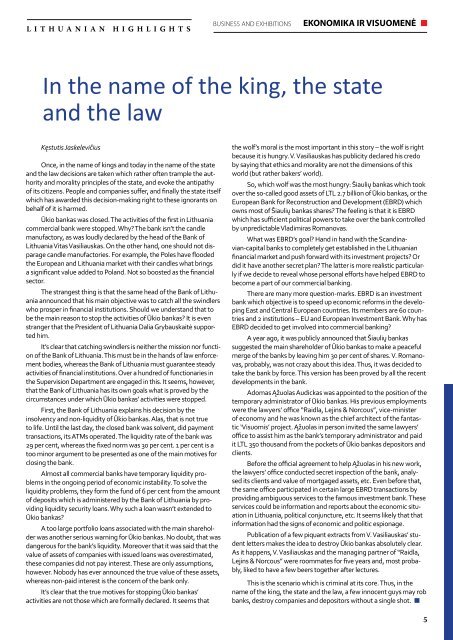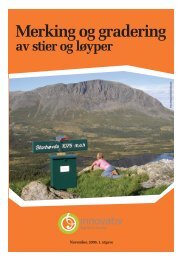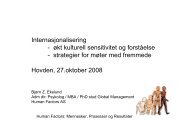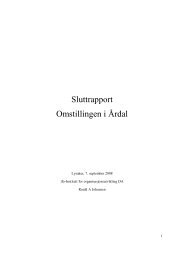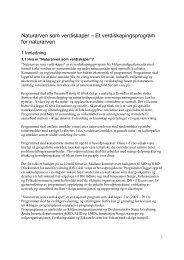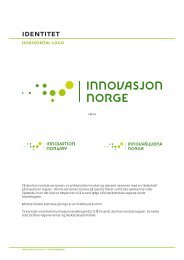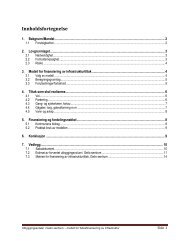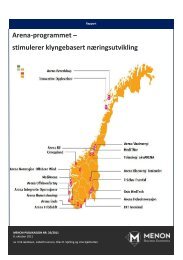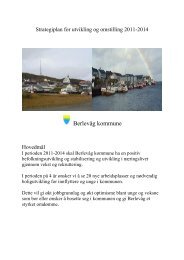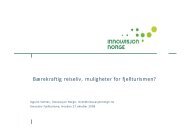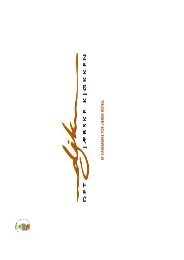EKONOMIKA IR VISUOMENE
EKONOMIKA IR VISUOMENE
EKONOMIKA IR VISUOMENE
Create successful ePaper yourself
Turn your PDF publications into a flip-book with our unique Google optimized e-Paper software.
LITHUANIAN HIGHLIGHTS<br />
BUSINESS AND EXHIBITIONS<br />
<strong>EKONOMIKA</strong> <strong>IR</strong> VISUOMENĖ<br />
In the name of the king, the state<br />
and the law<br />
Kęstutis Jaskelevičius<br />
Once, in the name of kings and today in the name of the state<br />
and the law decisions are taken which rather often trample the authority<br />
and morality principles of the state, and evoke the antipathy<br />
of its citizens. People and companies suffer, and finally the state itself<br />
which has awarded this decision-making right to these ignorants on<br />
behalf of it is harmed.<br />
Ūkio bankas was closed. The activities of the first in Lithuania<br />
commercial bank were stopped. Why? The bank isn’t the candle<br />
manufactory, as was loudly declared by the head of the Bank of<br />
Lithuania Vitas Vasiliauskas. On the other hand, one should not disparage<br />
candle manufactories. For example, the Poles have flooded<br />
the European and Lithuania market with their candles what brings<br />
a significant value added to Poland. Not so boosted as the financial<br />
sector.<br />
The strangest thing is that the same head of the Bank of Lithuania<br />
announced that his main objective was to catch all the swindlers<br />
who prosper in financial institutions. Should we understand that to<br />
be the main reason to stop the activities of Ūkio bankas? It is even<br />
stranger that the President of Lithuania Dalia Grybauskaitė supported<br />
him.<br />
It’s clear that catching swindlers is neither the mission nor function<br />
of the Bank of Lithuania. This must be in the hands of law enforcement<br />
bodies, whereas the Bank of Lithuania must guarantee steady<br />
activities of financial institutions. Over a hundred of functionaries in<br />
the Supervision Department are engaged in this. It seems, however,<br />
that the Bank of Lithuania has its own goals what is proved by the<br />
circumstances under which Ūkio bankas’ activities were stopped.<br />
First, the Bank of Lithuania explains his decision by the<br />
insolvency and non-liquidity of Ūkio bankas. Alas, that is not true<br />
to life. Until the last day, the closed bank was solvent, did payment<br />
transactions, its ATMs operated. The liquidity rate of the bank was<br />
29 per cent, whereas the fixed norm was 30 per cent. 1 per cent is a<br />
too minor argument to be presented as one of the main motives for<br />
closing the bank.<br />
Almost all commercial banks have temporary liquidity problems<br />
in the ongoing period of economic instability. To solve the<br />
liquidity problems, they form the fund of 6 per cent from the amount<br />
of deposits which is administered by the Bank of Lithuania by providing<br />
liquidity security loans. Why such a loan wasn’t extended to<br />
Ūkio bankas?<br />
A too large portfolio loans associated with the main shareholder<br />
was another serious warning for Ūkio bankas. No doubt, that was<br />
dangerous for the bank’s liquidity. Moreover that it was said that the<br />
value of assets of companies with issued loans was overestimated,<br />
these companies did not pay interest. These are only assumptions,<br />
however. Nobody has ever announced the true value of these assets,<br />
whereas non-paid interest is the concern of the bank only.<br />
It’s clear that the true motives for stopping Ūkio bankas’<br />
activities are not those which are formally declared. It seems that<br />
the wolf’s moral is the most important in this story – the wolf is right<br />
because it is hungry. V. Vasiliauskas has publicity declared his credo<br />
by saying that ethics and morality are not the dimensions of this<br />
world (but rather bakers’ world).<br />
So, which wolf was the most hungry: Šiaulių bankas which took<br />
over the so-called good assets of LTL 2.7 billion of Ūkio bankas, or the<br />
European Bank for Reconstruction and Development (EBRD) which<br />
owns most of Šiaulių bankas shares? The feeling is that it is EBRD<br />
which has sufficient political powers to take over the bank controlled<br />
by unpredictable Vladimiras Romanovas.<br />
What was EBRD’s goal? Hand in hand with the Scandinavian-capital<br />
banks to completely get established in the Lithuanian<br />
financial market and push forward with its investment projects? Or<br />
did it have another secret plan? The latter is more realistic particularly<br />
if we decide to reveal whose personal efforts have helped EBRD to<br />
become a part of our commercial banking.<br />
There are many more question-marks. EBRD is an investment<br />
bank which objective is to speed up economic reforms in the developing<br />
East and Central European countries. Its members are 60 countries<br />
and 2 institutions – EU and European Investment Bank. Why has<br />
EBRD decided to get involved into commercial banking?<br />
A year ago, it was publicly announced that Šiaulių bankas<br />
suggested the main shareholder of Ūkio bankas to make a peaceful<br />
merge of the banks by leaving him 30 per cent of shares. V. Romanovas,<br />
probably, was not crazy about this idea. Thus, it was decided to<br />
take the bank by force. This version has been proved by all the recent<br />
developments in the bank.<br />
Adomas Ąžuolas Audickas was appointed to the position of the<br />
temporary administrator of Ūkio bankas. His previous employments<br />
were the lawyers’ office “Raidla, Lejins & Norcous”, vice-minister<br />
of economy and he was known as the chief architect of the fantastic<br />
‘Visuomis’ project. Ąžuolas in person invited the same lawyers’<br />
office to assist him as the bank’s temporary administrator and paid<br />
it LTL 350 thousand from the pockets of Ūkio bankas depositors and<br />
clients.<br />
Before the official agreement to help Ąžuolas in his new work,<br />
the lawyers’ office conducted secret inspection of the bank, analysed<br />
its clients and value of mortgaged assets, etc. Even before that,<br />
the same office participated in certain large EBRD transactions by<br />
providing ambiguous services to the famous investment bank. These<br />
services could be information and reports about the economic situation<br />
in Lithuania, political conjuncture, etc. It seems likely that that<br />
information had the signs of economic and politic espionage.<br />
Publication of a few piquant extracts from V. Vasiliauskas’ student<br />
letters makes the idea to destroy Ūkio bankas absolutely clear.<br />
As it happens, V. Vasiliauskas and the managing partner of “Raidla,<br />
Lejins & Norcous” were roommates for five years and, most probably,<br />
liked to have a few beers together after lectures.<br />
This is the scenario which is criminal at its core. Thus, in the<br />
name of the king, the state and the law, a few innocent guys may rob<br />
banks, destroy companies and depositors without a single shot.<br />
5


